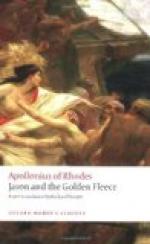BOOK IV
SUMMARY OF BOOK IV
Invocation of the Muse (1-5).—Grief of Medea, who flies from the palace during the night and joins the Argonauts (6-91).—By the aid of Medea, Jason seizes and carries off the golden fleece, after which the Argonauts depart (92-211).—Pursued by the Colchians, they land in Paphlagonia, where Argus shows them the route to take (212-293).—The Argonauts sail up the Ister, by a branch of which they make their way into the Adriatic, where they find their progress barred by the Colchians, who had come by a shorter route (294-337).—Agreement between the Argonauts and the Colchians: Medea’s reproaches to Jason (338-451).—Murder of Apsyrtus by Jason: the Colchians give up the pursuit (452-551).—The Argonauts sail along the Eridanus into the Rhone, and reach the abode of Circe in Italy (552-684).—Jason and Medea are purified by Circe: the Argonauts pass the isle of the Sirens, Scylla, Charybdis, and the Planctae (685-981).—Arrival among the Phaeacians: here other Colchians reclaim Medea, and, to prevent her surrender, her marriage with Jason is celebrated (982-1169).—Departure of the Argonauts, who are driven by a storm on to the Syrtes: they carry Argo on their shoulders to the Tritonian lake (1170-1484).—Deaths of Canthus and Mopsus (1485-1536).—The god Triton conducts Argo from the lake into the sea (1537-1637).—Episode of the giant Talos in Crete (1638-1693).—Arrival at the isle Anaphe: the dream of Euphemus, which is interpreted by Jason: arrival at Aegina and at Pagasae, the end of the voyage (1694-1781).
BOOK IV
Now do thou thyself, goddess Muse, daughter of Zeus, tell of the labour and wiles of the Colchian maiden. Surely my soul within me wavers with speechless amazement as I ponder whether I should call it the lovesick grief of mad passion or a panic flight, through which she left the Colchian folk.
Aeetes all night long with the bravest captains of his people was devising in his halls sheer treachery against the heroes, with fierce wrath in his heart at the issue of the hateful contest; nor did he deem at all that these things were being accomplished without the knowledge of his daughters.
But into Medea’s heart Hera cast most grievous fear; and she trembled like a nimble fawn whom the baying of hounds hath terrified amid the thicket of a deep copse. For at once she truly forboded that the aid she had given was not hidden from her father, and that quickly she would fill up the cup of woe. And she dreaded the guilty knowledge of her handmaids; her eyes were filled with fire and her ears rung with a terrible cry. Often did she clutch at her throat, and often did she drag out her hair by the roots and groan in wretched despair. There on that very day the maiden would have tasted the drugs and perished




